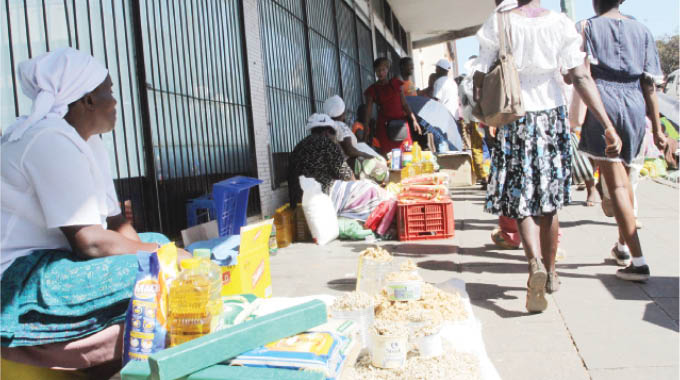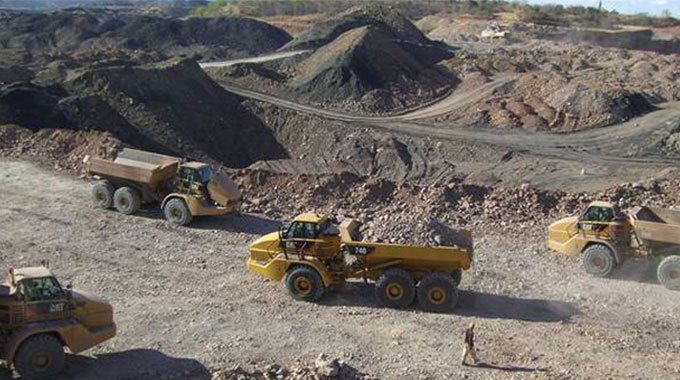Street grocery sales take Bulawayo by storm

Pride Mahlangu, Business Reporter
BUSINESS hours and shop location no longer matter when doing grocery shopping in Bulawayo as basic commodities are now easily accessible from the streets and pavements.
A Business Chronicle survey in the city has shown that more grocery products are now being sold at cheaper prices from pavements along the streets in the Central Business District and shopping centres across the city’s surbubs. These include soap, cooking oil, peanut butter, washing powder, rice, petroleum jellies, processed foods, carbonated and non-carbonated drinks and lotions.
The business, though illegal as it is being conducted in undesignated spaces by mostly unlicensed people, is booming. Traders mainly demand cash transactions but one pays a heavy premium when using mobile money payments. A majority of these are sold during the rush hours, especially after working from 4.30PM to 8PM. During weekends the traders have a free ride the whole day as there is little interference from the local authority police. Some permanently operate a vegetable market section.
There is suspicion that some of these products would have been smuggled into the country while some suspect that certain local manufacturers have set up their agents on streets to do sales in cash only.
Informal traders interviewed were not forthcoming about the source of their products. “I can only say these products come with omalayitsha (cross-border transporters), and we don’t know where exactly they are sourced,” said one trader who declined to be named.
Only a few acknowledged that their products were imported mainly from South Africa, with some being sourced locally.
“These products come from South Africa mainly and some from Zimbabwe, and maybe spaghetti from Mozambique,” said another trader who also requested anonymity.
Members of the public said they now prefer street grocery sales as prices there were lower compared to established shops.
“For instance, Nivea lotion costs $25 at vegetable market side while it’s $60 in supermarkets. Cooking oil costs $22 here and $26 in the supermarkets,” said one customer.
“The only challenge here is that street traders want cash and because it is in short supply we end up going to retail supermarkets for swipe and EcoCash.”
But to what extent are street grocery traders affecting operations of established retail supermarkets? Confederation of Zimbabwe Retailers (CZR) president, Mr Denford Mutashu said although established retailers were unfazed by the informal traders, consumers risk being exposed to uncertified and substandard products.
“We are concerned about the sources of those goods. From the analysis we have had, almost all those goods are smuggled into the country. So, while they are incessant benefits to the consumers on prices in the long run it is affecting industry,” he said.
“It is affecting the value chain players along the way and if nothing is done to arrest the rampant smuggling of goods, then certainly we may face challenges as far as growing the industry and the economy is concerned.”
Mr Mutashu admitted that low incomes were pushing people to seek cheaper products in the informal sector and advised established retailers to price their goods well to retain customers. He warned consumers against buying processed poultry and meat products from the streets as these could be contaminated or gone stale and could pose devastating health consequences. “We implore consumers not to buy perishable goods like poultry products and beef products because we have seen a lot of these being smuggled from Botswana as well as South Africa in Musina. This poses great danger because such goods are meant to be stored under favourable conditions,” he said.
Mr Mutashu added:
“This challenge requires a national strategy. For example, in terms of relaxing the tax laws for it to accommodate the informal sector and ensure that it becomes more favourable for them to register, reduce the cumbersome processes and even regulatory charges. That can actually go a long way to entice the members to regularise.”
Bulawayo Chamber of SMEs chairperson, Mr Energy Majazi, disputed claims that goods sold by the informal sector were smuggled into the country.
“That is an unfortunate comment from whoever made it. The informal sector is full of business persons otherwise better than those who consider themselves formal and yes, in any society you can’t fail to get hooligans or some uncouth people. Some might lack business ethics, but it doesn’t mean informal people are smugglers. Why should we smuggle when we have every system in place to get the goods into the country,” he said. — @pridesinstinctz.











Comments